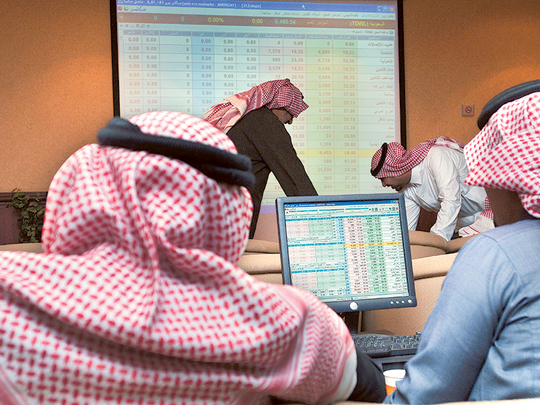
Riyadh: Saudi Arabia plans to almost double the size of its stock market, among the most closed in the world, by adding dozens of companies and making it easier for foreigners to invest.
The kingdom aims to attract privately-owned firms to list while privatisation by the government will also boost the market, said Mohammed Al Jada’an, chairman of the Capital Market Authority, the country’s regulator. The Tadawul All Share Index will increase to 250 companies from about 170 now and its $380 billion (Dh1.39 trillion) market capitalisation will grow to match the size of Saudi gross domestic product within seven years, he said.
The government wants to “make sure that the market becomes a real representative of the economy in terms of size,” Al-Jadaan said at the royal compound in Riyadh. The current value of listed companies stands at about 57 per cent of GDP, he said.
The ambitious plan is part of an unprecedented overhaul of the Saudi economy, the largest in the Middle East, to wean the country off oil. It’s being driven by Deputy Crown Prince Mohammad Bin Salman and was outlined in a five-hour interview with Bloomberg News last week.
Aramco IPO
The project includes the initial public offering of a small stake in oil giant Aramco, the creation of the world’s largest sovereign wealth fund and new budget measures that would raise at least an extra $100 billion a year by 2020, more than tripling non-oil income compared with now.
Developing the equity and debt markets by adding new listings and products is key to helping bring money into the economy. As well as broadening the stock index, the Capital Market Authority also plans to foster derivatives trading, the debt market and introduce real estate investment trusts, Al Jada’an said.
“The market is undergoing massive reforms to facilitate inflows into the kingdom, with the Tadawul playing a great conduit for channelling foreign investment,” said Rami Sidani, who helps manage $1.4 billion in stocks as the head of frontier investments at Schroders Plc in Dubai. “Aggressive privatisation is important to help the economy diversify away from oil.”
The Tadawul Index jumped the most since March 17 on Monday. It gained 1.4 per cent, paring the loss for this year to 10 per cent.
No stampede
While Opec’s biggest oil exporter is gradually removing barriers to the market, there’s hardly been a stampede. Since opening it to direct foreign investment in June, subject to strict rules, 11 overseas investors have received licenses as qualified financial institutions to trade in the market, Al Jada’an said.
Investors with a licence bought stocks valued at 3.2 billion riyals ($853 million) in March, according to data on the stock exchange website. That means total ownership of foreign investors stood at 4.4 per cent of total market capitalisation.
The new model for Saudi capitalism is designed to change that.
The Capital Markets Authority is planning derivatives to have a “vibrant and sophisticated” market and rules for REITs are scheduled by the end of this year, Al-Jadaan said. There are also plans for a secondary stock exchange for small and medium-sized enterprises that will be limited to “sophisticated investors,” he said.
“Currently, we have only the equity market as the really strong market,” he said. “We need to develop the debt side.”
Introducing derivatives would improve the efficiency of the market and allow investors to hedge risk while adding debt products would given them more choice, said Muhammad Faisal Potrik, the head of research at Riyad Capital.
“Our outlook for the market is positive for the long term based on these developments, although markets may remain volatile in the short-term on oil price movement,” he said.












